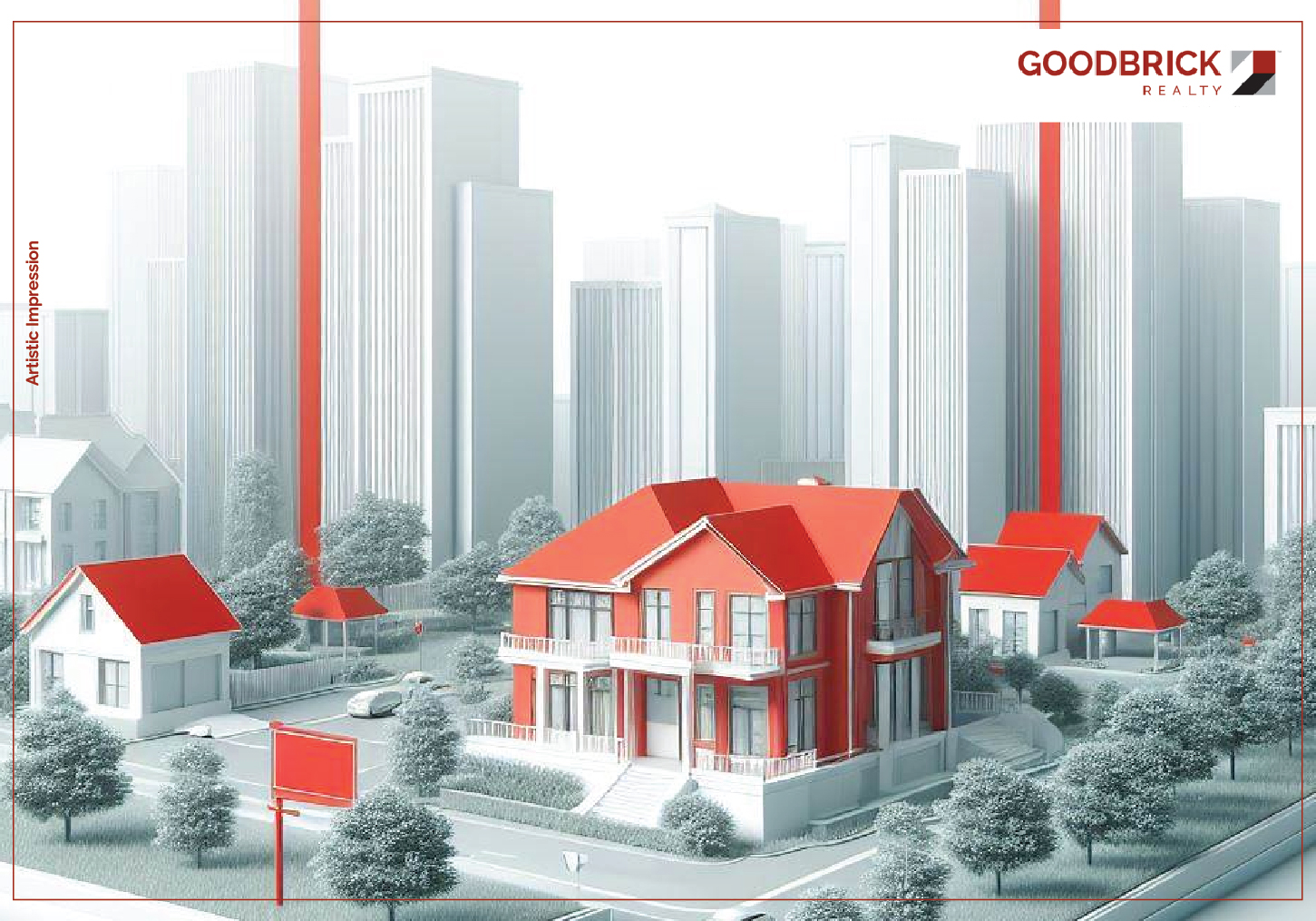
Real estate means different kinds of buildings and land. Each one is different and used for different things. Understanding these types is crucial for anyone venturing into the realm of property ownership and investment.
Broadly categorised, real estate comprises of,
Real Property and Personal Property.
Real property consists of immovable assets, typically land and everything permanently attached to it.
This category further branches to serve diverse needs and investment potentials.
Residential properties hold value influenced by location, amenities, and market trends. Knowing these characteristics helps with investment decisions.
For individuals, homes can serve as both shelter and investment.Deciding if the property will become worth more money or if you can rent it out for money is really important.
Determining whether the property is for personal residence or rental purposes affects investment strategies. This means getting a property primarily for yourself, like a home.For instance, buying a property like luxury villas in Khandala and renting it out can generate a steady income..
Choosing between buying or leasing property depends on financial goals and short-term plans. Here, you’d buy a property and then rent it out to someone else. This brings in a regular income, but it requires being a good landlord. You’ll need to manage tenants, take care of repairs, handle any problems or legal matters, and so on. It can be a good long-term investment because the property’s value usually goes up over time.
Short-term investment involves purchasing properties with the aim of selling them at a higher price, often after renovation or market appreciation. This is about buying a property, improving it somehow (like renovating or developing it), and then selling it quickly to make a moderate to medium profit. This is like a plan for a short time. It means buying houses and quickly selling them after fixing them up a bit.
Long-term investments focus on properties held over extended periods, aiming for gradual appreciation and steady rental income. This way is about buying houses and keeping them for a long time. The goal is to make the property worth more over many years.This kind of investment can support long-term goals like retirement because the value of the property tends to increase significantly over time.
Determining whether the property is for personal residence or rental purposes affects investment strategies. This means getting a property primarily for yourself, like a home. You might benefit because you can use it for yourself, pay less rent (if any), and its value might increase over time.Villa For Sale In Lonavala is an example that could serve either purpose, depending on your intent.
The decision to invest in a new or older property involves weighing factors like maintenance costs, market demand, and potential appreciation. When you’re talking about new buildings or houses, they usually come with really cool stuff like all the latest gadgets and features. Plus, they might be priced pretty attractively and you can often make them just the way you want.
But here’s the flip side: sometimes they take longer to finish than expected, which can be frustrating. Also, building new stuff can end up costing more than you planned, and there might be unexpected things that pop up along the way that you didn’t think about before.
Imagine buying the newest, fanciest phone. It’s got all the newest tech, looks great, and might even be priced well. But sometimes, there might be delays in getting it, you might end up paying more than you thought, and there could be some surprises or things you didn’t expect when you start using it. That’s a bit like what it’s like with new construction for houses or buildings!
Commercial real estate means buildings or places that are used for businesses. Such as buildings that aren’t houses and are used for businesses instead. Think offices for people to work in, hotels where people can stay, restaurants to eat at, gas stations for your car, grocery stores to buy food, theatres for watching movies, hospitals for healing, and shopping malls for buying clothes. These are all commercial real estate. Buying commercial real estate, like any other investment, has advantages and disadvantages.
Investing in commercial properties means buying buildings like offices or stores. People make money in two main ways: First, the building’s value can go up over time, making it worth more than what was paid. Second, renting the space to businesses brings in regular money.
When it comes to fancy homes in cool places like Luxury Villas in Khandala, it’s similar.These fancy houses can become even more valuable and make money when people rent them for vacations. Just like with offices and stores, buying these fancy villas can lead to making a good amount of profit as their value goes up and people pay to stay in them.
Including commercial properties in an investment portfolio diversifies risk and can provide stable income streams. Imagine an investment portfolio as a collection of different things you put your money into to make more money. Now, commercial properties are like one of those things you might choose to invest in. When you include them in your portfolio, it’s like adding a new flavour to your mix.
See, having different types of investments, like stocks, bonds, or commercial properties, is a smart move because if one doesn’t do well, the others might balance it out. Commercial properties, like office buildings or malls, can be a good addition because they often give you a steady flow of money from rent. This income can be pretty reliable, which helps cushion your overall portfolio if other parts are going through a rough patch.So, having these kinds of houses in your collection isn’t just about adding different things; it’s also about keeping your money safe and balanced.
Tax advantages for commercial real estate basically mean you get to lower the amount of taxes you pay on that property. The government gives you ways to reduce your taxable income by allowing deductions and special benefits for things like expenses related to maintaining or improving the property. These benefits can boost the money you earn from the house by reducing the amount of taxes you have to pay.
High initial investment and ongoing costs can be a barrier for many investors.
Commercial properties might not have immediate buyers, requiring time and effort for resale.
Dependence on tenants for rental income poses risks related to vacancies or default payments.
Industrial real estate is defined as any land used for manufacturing, shipping, storing, or other industrial purposes. These structures are designed to house manufacturing companies and the various operations that go with them. They can house factory space or even storage facilities.
When compared to other real estate sectors such as office and retail, industrial real estate is frequently less expensive to purchase and manage, and generates a more predictable cash flow.So, because of this, industrial real estate is seen as one of the strongest and most attractive types of investments.
Understanding metrics like Net Operating Income (NOI) and Capitalization Rate aids in assessing industrial property profitability. The two most important drivers of real estate value are net operating income and capitalization rate. A variety of levers can be used to increase commercial building operating revenue.
Industrial properties, with square footage ranging from 50,000 to over 500,000 square feet, have lower average rents per square foot than other asset categories, but their sheer size may amplify collecting rent, resulting in large top-line revenue.
Industrial leases typically last three to fifteen years, are longer than other asset types, and include yearly rent increases. Because of this leasing characteristic, industrial property is an excellent choice for real estate investors seeking long-term investment goals.
Current property owners may have an advantage because there are still few available properties in many high-growth urban areas.We think that the industrial sector will stay strong even when the economy is uncertain.
The plants, minerals, and water that exist on the earth’s surface and above it in the upper atmosphere are referred to as land. Immobility, invulnerability, and individuality are some of the physical characteristics of land, with each piece of ground differing geographically.
In India, there is a strong preference for purchasing plots. However, before proceeding with this aspect, it is necessary to determine the finances, the ideal location, and the necessary paperwork.
So we have now understood about the first part of Real estate, i.e. Real Property .
Now let’s have a look at Personal Property.

Personal property encompasses Tangible, Intangible, Real, and Intellectual categories, each having distinct characteristics.
There are four main types of personal property:
So, while tangible property is physical, intangible and intellectual properties are more about ideas, rights, and creations, and real property involves land and things attached to it.
Tangible property refers to physical assets like real estate, vehicles, and personal belongings.
Understanding the value, depreciation, and maintenance of tangible assets is vital for proper management, especially when considering investments like a Villa For Sale In Lonavala.These things are really important in figuring out if these real estate projects will be successful and make money over a long time.
Intangible property includes assets without a physical form, like patents, copyrights, and trademarks.
Exploring the value, protection, and commercialization of intangible assets is crucial for leveraging their potential.
Real property, as discussed earlier, pertains to immovable assets like land and structures permanently affixed to it.
Understanding the legal aspects, ownership rights, and investment potentials of real property is essential for effective management.
Intellectual property includes things that people create using their minds, like inventions, art, and designs.
Exploring the legal protection, licensing, and commercialization avenues for intellectual property is crucial for creators and businesses.
Contact Goodbrick Realty today! We’ll lead you through the steps and assist you in discovering the ideal property that matches what you’re looking for and what you can afford.